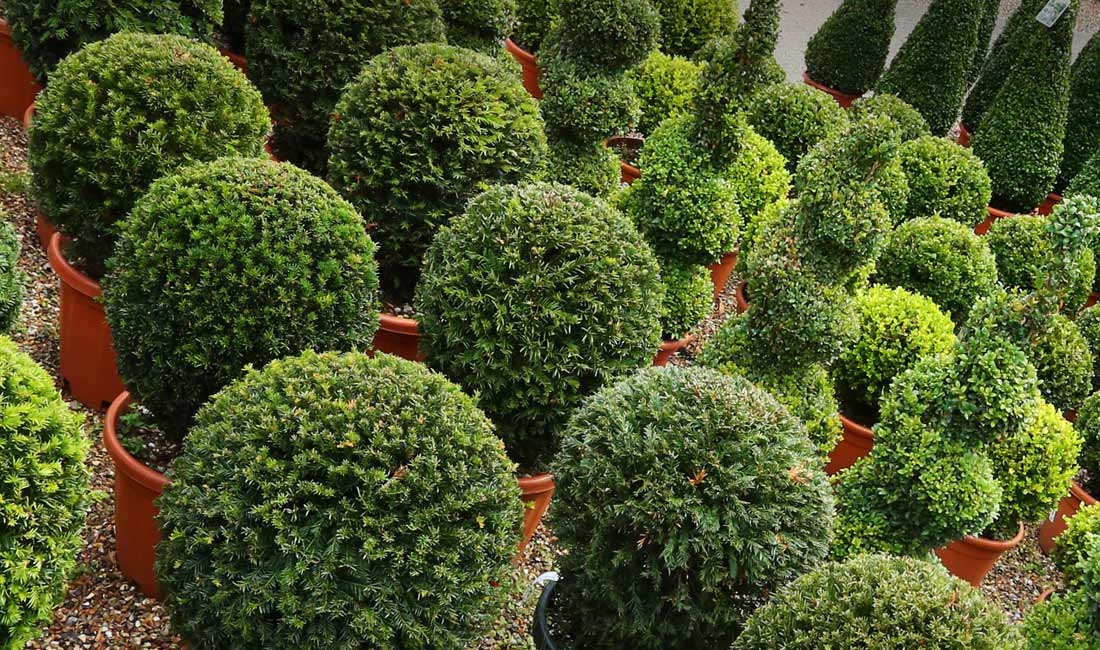
Topiary is an impressive way of adding evergreen structure to the garden and dates back to the times of the Romans who had a special slave called a topiarius to maintain their topiary. Topiary was popular all through the Middle Ages, in Renaissance Italy, in 17th Century France — and now again in the 21st Century.
Topiary is the art of cutting trees and shrubs into ornamental shapes, so creating living garden ‘sculptures’. Topiary makes an impressive statement in any garden, either formal or informal, traditional or contemporary. Topiary can be used as individual specimens, in groups of matching or contrasting shapes, or even interspersed in mixed informal planting to provide accent points.
Traditionally, long-lived plants such as yew (Taxus), bay (Laurus nobilis) and box (Buxus) were used for topiary but many more plants can be trained as topiary — including Photinia, Ligustrum and some conifers. Plants can be trained into a wide range of shapes from balls and cones to spirals and animals, not forgetting the stunning Japanese cloud pruned topiary.
Caring for Topiary
In the Spring, weed, feed (with a slow-release fertiliser) and mulch all topiary. Water as necessary, particularly in dry spells. All topiary that is clipped regularly requires generous feeding and watering, particularly if planted in containers. Brush off any snow in winter to avoid the splaying out of branches. Most topiary prefers full sun.
Pruning Topiary
The frequency and timing of pruning of topiary differs according to the type of plant - but, except for very complicated shapes, is not as difficult as it looks! Take time when clipping and shaping and stand back frequently to check for discrepancies. Work from the top down and from the centre outwards, moving from side to side to check the balance.
Our Favourites
Clifton Nurseries offers a wide range of topiary which differs according to availability but which usually includes the following favourites:
Taxus - “Yew” | Very small leaves so good for dense shapes with precise lines. | One trim per year may be enough. Prune between late spring and early autumn. |
Buxus - “Box”
| Small leaves so good for dense shapes with precise lines. New growth is light green. | May need 2 or 3 trims per year. Prune between late spring and early autumn. ‘Greedy’ plant, so feed and water well. Treat regularly for Buxus blight and Buxus caterpillar. |
Ilex - “Holly” | Available in variegated colours as well as green. Berries in winter. | Slow growing — one trim per year between late spring and early autumn. |
Ilex crenata ‘Kimne’ “Small leaved Holly” | Often used for stunning Japanese cloud pruned shapes. | One trim per year between spring and early autumn — very precise shapes may need a second trim. |
Ligustrum jonandrum “Privet” | Very small leaves so good for dense shapes with precise lines. | May need 2 or 3 trims per year. Prune between late spring and early autumn. |
Camellia | Requires acid soil. Autumn flowering and spring flowering varieties available. | Prune only after flowering to avoid flower loss. |
Cupressocyparis leylandii ‘Castlewellan Gold’ | Small foliage so good for spirals and other intricate shapes. | Fast growing — may need 2 or 3 trims per year. ‘Greedy’ plant, so feed and water well. |
Laurus nobilis “Bay” | Larger leaves so good for solid shapes such as balls and cones. Leaves can be used in cooking! | 1 or 2 trims per year between late spring and early autumn. |

Clifton Nurseries Garden Centre
London, W9 2PH
Bank Holidays open until 7pm
0207 432 1867
Mon-Fri 9am - 5.30pm; Sat 9am - 7pm; Sun 10.30am - 4.30pm
Clifton Nurseries Garden Services
London, W9 2PX
